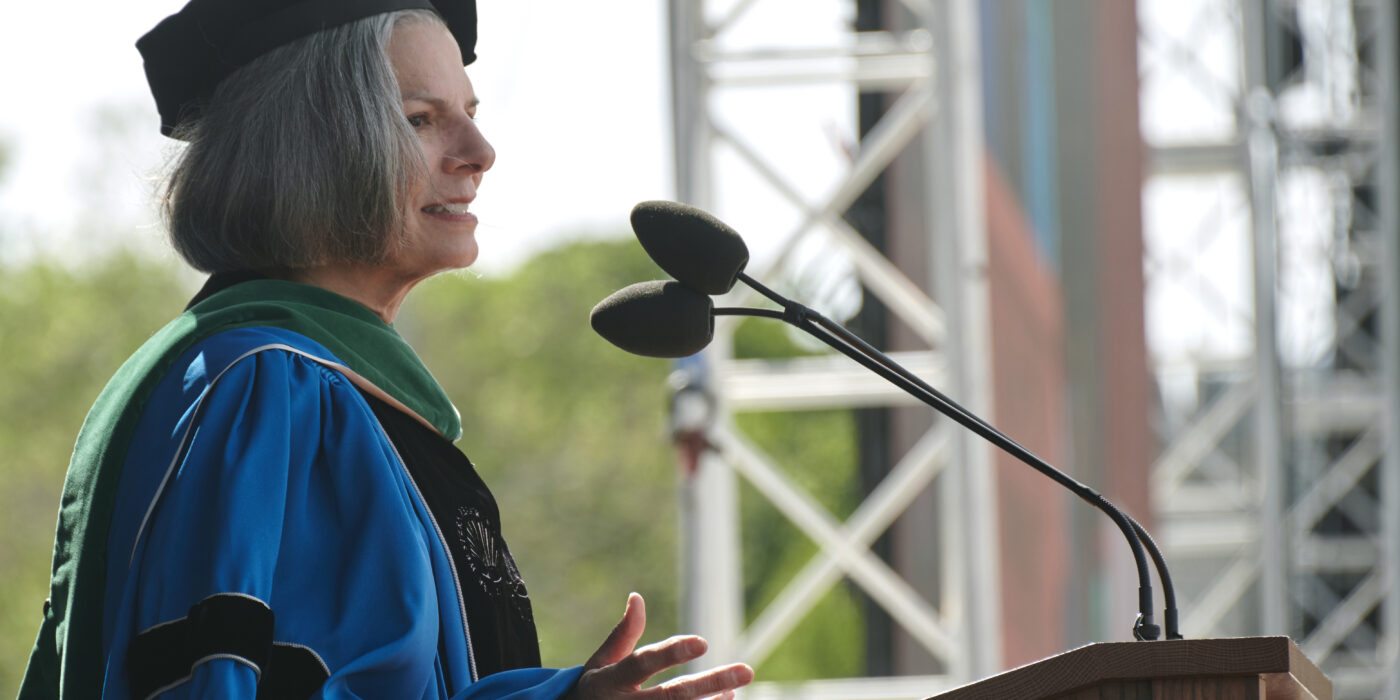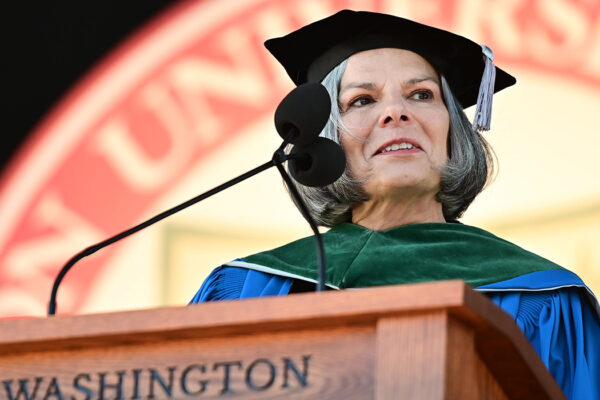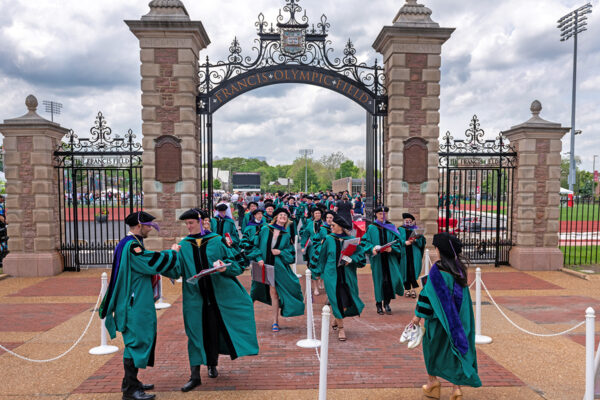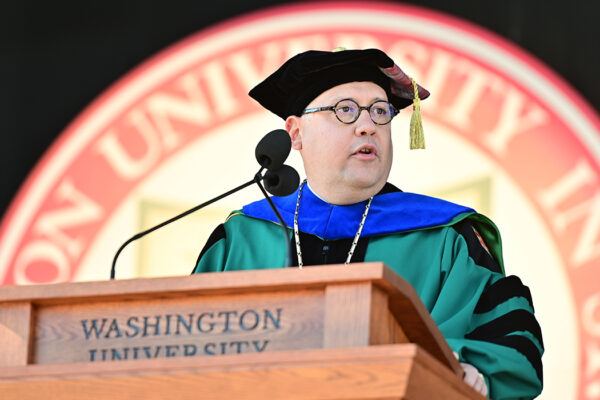Thank you for the kind welcome and congratulations to the Washington University in St. Louis Class of 2020! I’m privileged to join you and your parents and other guests, as well as Chancellor Martin and the distinguished faculty, to commemorate this very special day. Your academic achievements are surpassed only by your resilience during the past 14 months.
Last March, when Chancellor Martin announced that the 2020 Commencement ceremonies at the university were cancelled — the first time in 159 years — he called upon you to help “flatten the pandemic curve.” His message must have been heartbreaking for you and your families, but you rose to the occasion — with responsibility, creativity and solidarity — and I hope you take great pride in that. The chancellor also promised that the university would find ways to come together to celebrate your graduation at a future date, and thankfully, here we are together today to do just that.
The fact that so many of you and your families are participating in today’s ceremonies — a full year after you actually graduated — is a remarkable tribute to the value you place on your connections to each other, your faculty and the university. You’re embarked on new chapters in your story — perhaps additional educational experiences, or new jobs, or new adventures. Nevertheless, you made this Commencement celebration a Memorial Day weekend priority. To help me understand why, I spoke with a few of you earlier this month.
Rachel Kleinhandler, who was a Civic Scholar in the university’s Gephardt Institute, impressed me with her enthusiasm for all things WashU. She fell in love with the school when she visited the campus in 10th grade, perhaps conditioned by her mom, who is also an alumna. Rachel was thrilled to enroll and stated: “there is nothing I didn’t like about my experience”; “the campus community was always warm and supportive, even when we suddenly moved to remote learning.”
Likewise, Sarah Perlin, who is now attending Duke University School of Law, also “loves the university.” She was disappointed to miss the traditional sentimental graduation send-off last year, but she and her friends have made the most of the pandemic’s challenges and are eager to meet face-to-face this weekend — and maybe even enjoy a party. Sarah said she had “fabulous professors” and was amazed by how quickly everyone adjusted to online classes. She also described how she and others made a point to “check in with friends of color” who were at risk for racial strife or social stigma and expressed pride in the many community outreach activities the university prioritized.
I’m sure each of you has your own story to illustrate your experience with the “Great Pandemic Pivot” — the point in time in March of 2020 during spring break when students received the email alert that “school is closing — you will need to go to your permanent home — and classes will resume online only.” For a time, what had been a predictable rhythm of campus life probably became a cacophony of directives, disruptions and distractions. But only for a time. With impressive leadership agility, and responsibility shared by the entire university community, learning continued, students graduated, and campus life adjusted to the pandemic.
The Class of 2020 is very special. Like all WashU graduates, you’ve certainly gained the knowledge and experiences that you were promised by this outstanding institution when you enrolled. But you also had the chance to acquire some poignant and yet powerful life lessons that other students often miss — sometimes for their entire lives. You’ve learned to cherish your time with friends and loved ones. You have more confidence in your ability to adapt to unexpected adversity. You’ve become more mindful of your individual and collective vulnerability as well as your power. And despite your personal challenges, many of you also experienced the joy of helping others who are not so fortunate to find their way through crises. I believe you all deserve an honorary degree in Pandemic Arts and Sciences for your extraordinary achievements!
I’ve been a pioneer of plagues since my medical internship at UC San Francisco, which commenced 40 years ago in June, the same month that the first report describing gay men with what we now know to be the leading edge of the AIDS pandemic was published. As I moved from academia to CDC to Merck, I confronted other epidemics: SARS, avian influenza, West Nile virus, and Ebola virus infection, to name a few. Like AIDS, these diseases lacked effective vaccines and treatments when they emerged, and all were complicated by troublesome social and geopolitical surround sound. But none of these challenges prepared me for the scale, complexity, and impact we are facing with the current SARS-CoV-2 pandemic.
We are engaged in a global battle of epic proportions — virus, variants, and vulnerability on one side — and vigilance and vaccines on the other. Our rapid scientific achievements have provided the tools to prevent and treat SARS-CoV-2 infection, and where they are available and trusted, the prospects for containment are rapidly improving. But the battle is far from over, and sadly, in some countries like India and Brazil, right now the virus and its variants are winning.
The human consequences of the pandemic are tragic. My family and several friends have been afflicted, and I’m sure that many in this audience have been ill or lost loved ones. And we must not ignore the other burdens the pandemic and our responses to it have created for families, school children and their teachers, health-care providers and all the people who sustain the goods and services that keep the rest of us going. In any crisis — climate change, racial strife, war — it is always the most vulnerable and least enfranchised who are on the frontlines and who suffer the most. This pandemic is certainly no exception.
Arundhati Roy is a renowned Indian human rights and environmental activist who won the Booker Prize for her best-selling novel “The God of Small Things.” She was interviewed by the Financial Times in April of 2020 and described the SARS-CoV-2 pandemic in terms I will never forget. She stated:
“Historically, pandemics have forced humans to break with the past and imagine their world anew. This one is no different. It is a portal, a gateway between one world and the next. We can choose to walk through it, dragging the carcasses of our prejudice and hatred, our avarice, our data banks and dead ideas, our dead rivers and smoky skies behind us. Or we can walk through lightly, with little luggage, ready to imagine another world. And ready to fight for it.”
I’ve been haunted by this quote for the past year. Many people long for a return to “normal” — but the simultaneous calamities unfolding in our society force us to see that the old normal was not good enough — not even close. Not good enough to assure we can be safe in our communities and places of worship. Not good enough to guarantee food security or an affordable quality education for our children. Not good enough to achieve health equity in our country or anywhere else in the world. Not good enough to eliminate structural racism. Not good enough to ensure criminal justice and economic opportunity for all. And certainly not good enough to save our planet.
As Roy admonishes us, we must imagine another better world and then stride boldly through the portal of this pandemic to fight for it. And as I face the Class of 2020, I feel like I am standing on the precipice of hope. You are graduates of one of our finest universities — and succeeded in achieving your academic goals despite a disruptive pandemic. You’ve already stepped up to address important societal issues in the campus community and beyond.
Each of you is a power of one — capable of deploying your talent and energy to the cause. But collectively, you are a powerhouse for generating ideas and advocacy that will catalyze meaningful change in our world. Please fight for that change. Be bold. Persist in pursuing your passion. And above all, cherish the community of friends who brought you back you to WashU today.
Thank you for the privilege of participating in your Commencement celebration. It is a true honor and brings me great optimism. Congratulations to the Washington University in St. Louis Class of 2020!



